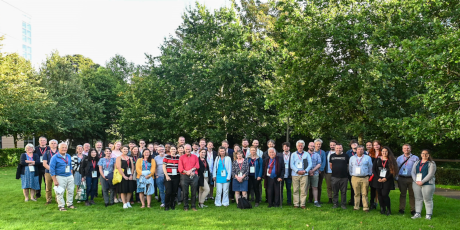Origins of Ireland’s Biodiversity Conference 04 Oct 2023

Sponsored by Fota Wildlife Park, The School of Biological, Earth and Environmental Sciences and the Environmental Research Institute, the Origins of Ireland’s Biodiversity (OIB) Conference was hosted by UCC at the Western Gateway Building, from 8th-9th September, 2023. The conference was formally opened by Prof Astrid Wingler (Head, School of BEES, UCC), who delivered a presentation of plethora of research conducted at the School of BEES and the ERI to support conservation, biodiversity, and sustainability. Running for 2 days, with over 80 delegates in attendance, two plenary presentations were given by Dr Chris Stimpson (Oxford University Museum of Natural History) and Dr Denise O’Meara (South East Technological University). From past ecosystems to present, the plenaries provided fascinating insights on the links between ancient bones and contemporary biological conservation, and how the genetic origins of Ireland’s fauna inform biodiversity strategies under climatic change. An additional 25 presentations captured a mosaic of scientific findings and perspectives concerning the formation of Ireland’s early and contemporary fauna and flora biodiversity, including the role of various human settlers in shaping Ireland’s biodiversity. Notably, the Environmental Research Institute sponsored OIB attendance for 11 postgraduate students from across the island of Ireland; one of whom, Rebecca Synnott (South East Technological University), was awarded a prize by Fota Wildlife Park for best student poster. The social highlight was a BBQ dinner held at the heart of Fota Wildlife Park, while the conference also provided an open forum, chaired by Dr Paddy Sleeman (School of BEES, UCC), for national and international experts to hold holistic discussions around previously unanswered questions concerning Ireland’s biodiversity and the functioning of our ecosystems, such as community structure and prey gaps within historic and modern food webs, ecological interactions among contemporary species, and the development of targeted conservation efforts, informed by historic data and modern analytical techniques.
Photo Credit: Prof Michael O’Connell, Galway
